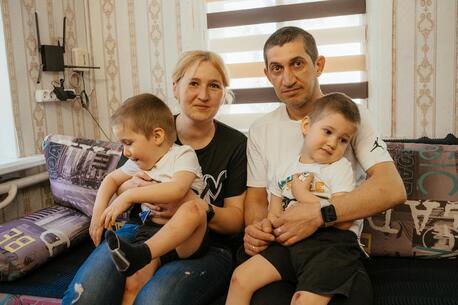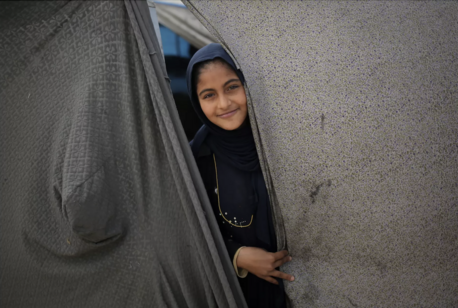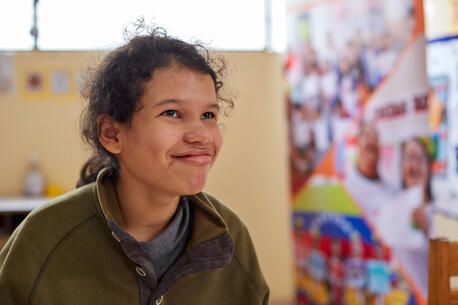
The Power of Sports and Play
Physical activity is critically important for children's health and well-being. A look at some of the ways UNICEF protects children's right to play — helping them reap the benefits — around the world.
From strengthening bodies and developing brains to helping children learn and deal with adversity: the many benefits of play
It’s hard to imagine childhood without play. When they play, children learn how to explore, invent, create and collaborate with others. Those skills help them when they are very young as they make friends and learn how to be in the world. But they are just as critical as kids get older — at school, on the playing field and, eventually, when they are old enough to earn a living.
Studies show that sports and physical activity strengthen kids' bodies and developing brains, helping them learn and stay focused in school. The American Academy of Pediatrics (AAP) even recommends that doctors prescribe it for their patients.
When times are tough, active play also helps children deal with adversity. The pleasure and connections children tap into when playing together or with adults are a powerful antidote to the stress that can build up in a child who's endured trauma.
While over-scheduling is often what cuts into children's playtime in the U.S., the barriers in many other parts of the world are often much more dangerous and difficult to address. There are children who must spend hours every day fetching safe water for their families, for example, leaving little time for play. For children who live in war zones, a safe place to have fun and run free is but a dream.
When families can’t afford healthy, nutritious food, their children may have little energy to play. Children living under such duress desperately need the relief that playtime offers. Without it, they can suffer long-term effects.
To protect vulnerable children's right to play — and reap the many benefits — UNICEF promotes physical activity and sports to ensure the health and well-being of children everywhere. Some examples:
India

Mohit Uikey, 8, practices the martial arts he learned in a UNICEF-supported program in central India teaching self-defense to boys and girls who have dropped out of school to avoid sexual harassment.

Bharti Sonkar, 18, gets in some early morning batting practice with her cricket team. Launched as part of a UNICEF-supported campaign to promote sports and physical fitness among girls, Bharti's team empowers girls from tribal communities in India, bolstering their defenses against sexual harassment and gender and caste discrimination, while encouraging them to exercise their rights to free expression and dream big.
Djibouti

Girls play soccer at the LEC center of Boul'aos in Djibouti, just outside the capital, where a diverse community of primary school children can take classes and play sports. Migrant and undocumented children, those with special needs, children who live in nomadic communities and girls are routinely denied social services and frequently don't make it to school. But here, thanks to UNICEF, they are guaranteed what all children should have: the chance to get active, play sports and have fun.
Mali

Alou Keïta, a Back-to-School Child Ambassador in Mali, works to raise awareness among parents and kids about the importance of education — while playing soccer with his classmates every chance he gets. "In a dugout, on a motorbike, on foot or through a discussion on the radio, I will do everything to get the message out to parents to send their children to school," he says.
Uganda

Girls from South Sudan play volleyball at a UNICEF Child-Friendly Space in Uganda's Bidi Bidi refugee settlement, home to tens of thousands of children who fled with their families to escape violence and hardship. UNICEF-supported services at the settlement help provide the emotional support children need to heal from the trauma of displacement. “When I play with my friends, I forget most of the bad things that have happened,” says one 15-year-old refugee.
Venezuela

UNICEF Venezuela staff play with children at a UNICEF Child-Friendly Space set up for children who have been exposed to violence and deprivation. In these warm and welcoming environments, children and adolescents get a vital reprieve from the struggles of their daily lives as they play and learn in safety.
Kenya

Doing the cobra pose is fun for this little girl from Kenya. It's also a great way for her to cope with chronic stress. UNICEF has used yoga to complement counseling therapy in assisting children who have experienced trauma.
Syria

Bayan, 11, has loved playing ping pong for as long as she can remember. Though she and her family were forced out of their home in Aleppo, Syria, she refuses to let the war there or her disabled arm hold her back. Thanks to cash assistance her family received from UNICEF, her family could afford to enroll her in table tennis lessons. “She used to be very shy and would keep to herself,” Bayan’s mother, Amina, said. “Now she’s more confident; she spends her days practicing table tennis with other children."
Belarus

In Minsk, Belarus, 3-year-old Agatha has an aquatherapy session with her rehabilitation swim teacher at a pool with facilities for children with disabilities. Agatha has cerebral palsy, but thanks to UNICEF and inclusion programs for children with special needs, she gets lots of support and equal opportunities to play. Agatha's mom takes her to an early childhood intervention center, where she participates in fun activities that aid her development. UNICEF supported government efforts to adopt national legislation to establish similar facilities in other municipalities to reach more kids like Agatha.
HOW TO HELP
There are many ways to make a difference
War, famine, poverty, natural disasters — threats to the world's children keep coming. But UNICEF won't stop working to keep children healthy and safe.
UNICEF works in over 190 countries and territories — more places than any other children's organization. UNICEF has the world's largest humanitarian warehouse and, when disaster strikes, can get supplies almost anywhere within 72 hours. Constantly innovating, always advocating for a better world for children, UNICEF works to ensure that every child can grow up healthy, educated, protected and respected.
Would you like to help give all children the opportunity to reach their full potential? There are many ways to get involved.





